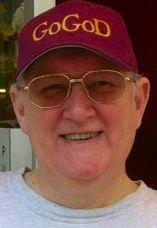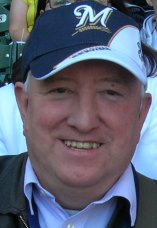Games of Go on Disk began in the era of floppy disks. T Mark Hall had begun transcribing games of Honinbo Shusaku from Invincible onto disks, and then small collections of other games from English sources – collections were then limited by disk size to 300 games.
A major step forward came when Mark was able to acquire a complete edition of Go Seigen games in Korea, and eagerly began transcribing over 800 games. But he needed help with translating the names and tournament data that went with the games. This was where John Fairbairn came in.
The resulting collections were in great demand among British go players, and the GoGoD partnership was formed to offer sets for each player.
For the first few years only player sets were offered, but in August 2001 we began offering a database. The first edition, introduced at the European Go Congress in Dublin, had around 11,700 games.
At that stage, looking at our own resources and the number of pro games being played, and the time it took to input games, we thought that the upper limit for any database would be in the region of 40,000 games. As of January 2014, the total had zoomed to over 79,000.
The number of pro go tournaments expanded rapidly, and we also became more efficient at inputting games. But two other factors spurred on growth. One was the fact that the two founders were in a position to build up a library of sources through frequent visits to the Far East. The other was that many friends began helping with the project.
A list of people who have helped in some significant way is given below. But two in particular have helped with inputting: Jan van Rongen of the Netherlands and Tom Koranda of the Czech Republic. Harry Fearnley and Charles Matthews have also given massive help by providing loans of rare sources.
In the course of producing twice-yearly updates, both Mark (a diplomat) and John (a journalist) officially became grumpy old men and so were able to devote themselves to the database fully, and to a huge encyclopaedia that was bundled on the database CD. Nevertheless, they decided that a finite cut-off point was needed, and settled on a target of 100,000 games.

Sadly, Mark was cut off in his prime with a long illness that eventually took him from us in December 2013.
Nevertheless, he expressed a strong wish that GoGoD should continue. Over the years, as Keith Arnold of Baltimore kindly pointed out in the many tributes that accompanied the announcement of Mark’s passing, “according to GoGoD” had become to the western go world what “according to Hoyle” had become to games players in general. Mark was also the public face of GoGoD, through the miniature stall he set up at tournaments throughout the world. He was well aware how attached today’s players had become to the idea of having a huge number of games on tap.
He therefore left a large reserve of games to be added towards the 100,000 and John has undertaken to try to keep the ship afloat.
Still, it has to be said that Mark, indefatigable and totally reliable, is quite irreplaceable, and so some major changes have had to be made – all with his blessing.
The first is to shift from CD distribution to an online download via this site – no more CDs will be issued at all. Second, the encyclopaedia and the various programs such as the database reader, all of which require constant maintenance, have been ditched. We now offer only raw sgf data and it is up to the user to find ways of using the data – as many have already done, of course, most notably with Kombilo (www.u-go.net/kombilo/) and Drago (godrago.net), superb free resources proved by Ulrich Goetz and Gilles Arcas-Lukue.
But for those who like their ready-cooked beans in a can with lashings of sauce, the entire database is also available on SmartGo (www.smartgo.com) products for Windows, Mac, iPhone and iPad. The Mac and iOS versions of SmartGo also include access to the massive GoGoD Names Dictionary which contains biographical data on just about every go personage – players and others – of note.
ROLL OF HONOUR

T Mark Hall
T Mark Hall’s first posting as a diplomat was to Tokyo. He returned from there bearing the unique gift of a diploma signed by Iwamoto Kaoru, Rin Kaiho and Murashima Yoshikatsu. In the course of transcribing pro games for the database (with no other go study) he improved two grades and became 4-dan. He tied for a place in the 2009 British Championship match, and also won the 2000 British Open in Norwich, subsequently winning the 2003, 2004 and 2008 events (and also the 2008 Lightning Championship). He represented Britain in amateur events in Japan, China and Korea. He was Treasurer and Council Member of the British Go Association for more than two decades. His bequests included significant funds to help promote British go, and young British players in particular, and his antique board was accepted as a donation by the British Museum.

John Fairbairn
Although also a dan player, John Fairbairn has always preferred go history to playing in tournaments. Professionally his background was in translating Oriental languages and journalism. He has presented history papers at three International Conferences on Baduk and has written or translated many go books, most notably a series on Go Seigen’s ten-game matches and a full-length biography of Honinbo Shuei. He too has been an elected Council Member of the British Go Association. He was go editor of the Mind Sports Organisation website. He was the main contributor to George Hodges’ Shogi Magazine over its 11 years, and so also has links with shogi pros. He also has computing experience through working with David Levy on the world’s first successful shogi program.
Over those years of constant effort, the CD age and the internet have helped us grow. But we have also been fortunate to have enjoyed the help and cooperation of many go friends. Special big thank yous are due to (in random order) Charles Matthews, Jan van Rongen, Tom Koranda, Keith Rapley, Gilles Arcas-Lukue, Arnoud van der Louff, Ulrich Goetz, Mike Vaughn, Ales Cieply, Pieter Mioch, Jim Gillogly, Andrew Grant, Richard Hunter, Jochen Fassbender, John Power, Gary Odom, Li Jianqi, Anders Kierulf, Robert Jasiek, Rui Jiang, Bill Cobb, Chuck Robbins, Dan Gilder, Gordon Fraser, Jerome Hubert, Jan Derksen, Theo van Ees, Denis Feldmann, Jerry Keller and others. We are also grateful for the direct cooperation of the Nihon Ki-in, the Kansai Ki-in, the Hanguk Kiweon (and Baduk magazine), Oromedia and the professionals Liu Yajie, Wang Hongjun, Nam Ch’i-hyeong, Shigeno Yuki, Michael Redmond, Maeda Ryo and Alexandre Dinerchtein.
